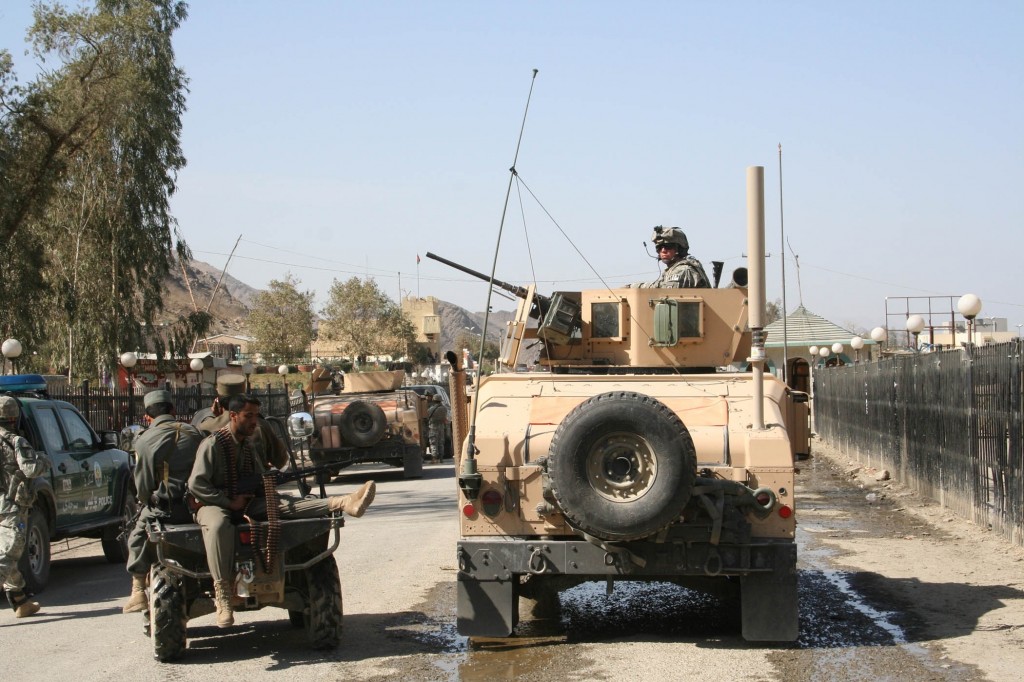Afghanistan, Pakistan Figures Arrive for Talks in Washington
Top officials from Kabul, Islamabad hope to have a say in the Obama administration’s new blend of diplomatic, developmental and military approaches for the two countries.
Jul 31, 2020132.3K Shares2.3M Views

American forces and Afghan police patrol the border with Pakistan. (U.S. Army photo)
With a much-anticipated reassessment of U.S. strategy toward Afghanistan and Pakistancoming from the White House by April, a host of senior officials from Afghanistan and Pakistan are arriving in Washington Monday to lend their perspectives to the Obama administration and Congress.
Numerous top security and development officials from Kabul and Islamabad are slated to meet with the Obama administration, leading congressional figures and each other during a week’s worth of events. Pakistani Foreign Minister Foreign Minister Rangin Dadfar Spanta and his top adviser Davood Moradian; Defense Minister Abdul Rahim Wardak; Interior Minister Mohammad Hanif Atmar; intelligence chief Amrullah Saleh; local-governance chief Jelani Popal; and U.N. ambassador Zahir Tanin.
Illustration by: Matt Mahurin
The White House review of what officials are referring to as “Af-Pak” — underscoring how Obama administration officials believe the extremist threat facing the two countries to be inextricable — is intended to be a “comprehensive” reassessment, as Press Secretary Robert Gibbs put it on Monday, of what American goals ought to be in a war that has lasted seven and a half years with little end in sight. The goal is to yield a new blend of diplomatic, developmental and military approaches for the two countries to “root out those safe havens” for Al Qaeda and Taliban militants in the tribal areas of Pakistan supported by Taliban advances in Afghanistan, as Obama described the goals “that would ultimately make our mission successful” in his Feb. 9 press conference. In background conversations, Obama aides explain that the president wishes the review to distinguish between achievable and unachievable goals, a point of departure from the Bush administration’s stated desire for an Afghan democracy and a Pakistan run by a pro-U.S. strongman.
Representatives of the foreign governments expressed relief that their capitals’ perspectives would be included in the review. “The Afghan government is extremely pleased that the Obama administration is seeking Afghanistan’s consultation and advice during the strategic review process,” said an official with the Afghanistan embassy in Washington who did not wish to speak for attribution. “For the international effort in Afghanistan to succeed, we need to approach the country’s challenges as partners, and this is the first step in that process. We also look forward to forging ahead with a new coordinated and comprehensive regional strategy to overcome the joint challenges that Afghanistan and Pakistan face.”
The Afghanistan war and its spillage into Pakistan is one of the most pressing national-security dilemmas the Obama administration is confronting. In Afghanistan, declining domestic popularity for President Hamid Karzai, the clear favorite of the Bush administration, has created a chilly relationship between Karzai and Obama. The first phone call between the two leaders took place on Feb. 18, nearly a month after Obama took office and long after Obama had spoken with leaders from China, Pakistan, Australia, the U.K., South Africa, Turkey and even the figurehead king of Spain. In Pakistan, after a weeks-long battle that left over 1,500 dead and hundreds of thousands displaced, the Taliban has taken control of the Swat Valley, a few hours’ drive from the capital city of Islamabad. A declared ceasefire pursued with great fanfare last week by the government of Asif Ali Zardari didn’t stop the Taliban from taking a government official hostage briefly on Sunday.
The Afghan and Pakistani officials will run the gamut of official Washington. Tuesday will feature a** **meeting between the two foreign ministers at an area hotel. The Afghanistan delegation will have lunch at the White House on Wednesday and afterward offer its input to the strategy review, which is chaired by former CIA official Bruce Reidel, Undersecretary of Defense Michele Flournoy and Amb. Richard Holbrooke, the administration’s special envoy to “Af-Pak.” Retired Marine Gen. Jim Jones, Obama’s national security adviser, is slated to attend, according to an itinerary of the trip provided by the Afghan embassy in Washington.
While a spokesman for the Pakistani embassy in Washington, Nadeem Kiani, said that the details for Foreign Minister Qureshi’s White House meeting were still being arranged, Qureshi would meet with Sen. John Kerry (D-Mass.), chairman of the Senate Foreign Relations Committee, on Tuesday afternoon, and would proceed to the State Department for a meeting with Secretary of State Hillary Rodham Clinton. Army Chief of Staff Kayani will meet with “military officials” and Secretary of Defense Bob Gates as well, Kiani said, but Kiani did not have specifics about that itinerary. Kayani also has a meeting scheduled with Kerry for Wednesday afternoon, according to Frederick Jones, a spokesman for the Senate Foreign Relations Committee.
“Sen. Kerry will be looking to hear answers to the many questions he’s raised about the future direction of the country and how we can work together cooperatively to make our policies successful,” Jones said. At a Senate roundtable on Afghanistan on Feb. 5, Kerry noted, “Governance is a huge issue on the minds of people who, a year and two ago, were 100 percent with us and supportive but who today, because of the failure of governance, not because of the Taliban necessarily, not because of an alternative ideology, are questioning our presence.” Jones added that Kerry looked forward to hearing from both delegations “about how we can work with them to solve the intractable difficulties” in Afghanistan and Pakistan.
Both delegations will attend a dinner on Wednesday night at the State Department, previewing a Thursday meeting between both delegations and Clinton. In between, the delegations will meet with the leadership of the Senate Foreign Relations Committee, the House intelligence and armed services committee and other congressional dignitaries of both parties; as well as members of the press. The Center for a New American Security, a Democratic-aligned think tank whose experts now staff the Obama Pentagon** **and State Departments, will host a press conference with Wardak, the Afghan defense minister, on Thursday.
One former U.S. senior** official who worked on Afghanistan and Pakistan issues, who requested anonymity, expected the Swat conversation to be uncomfortable. “A cabinet minister is very unlikely to have the go-ahead to back away from a decision taken by the government… that would be displeasing to the U.S.”The official added that although it’s unclear how much influence the delegations will ultimately hold over Obama’s strategy review “it’s very valuable to ask the folks with whom we’re doing business”**about the state of U.S. policy toward their countries.
A reportreleased Monday from the Government Accountability Office, the nonpartisan research arm of Congress, found that the U.S. had “not met its national security goals to destroy terrorist threats and close the safe haven” for Al Qaeda in the tribal areas of Pakistan. A statement from the office of Sen. Robert Menendez (D-NJ) said the GAO report indicated that “the strategy in place over the past seven years must be rethought if we are to improve our security.”

Rhyley Carney
Reviewer
Latest Articles
Popular Articles
